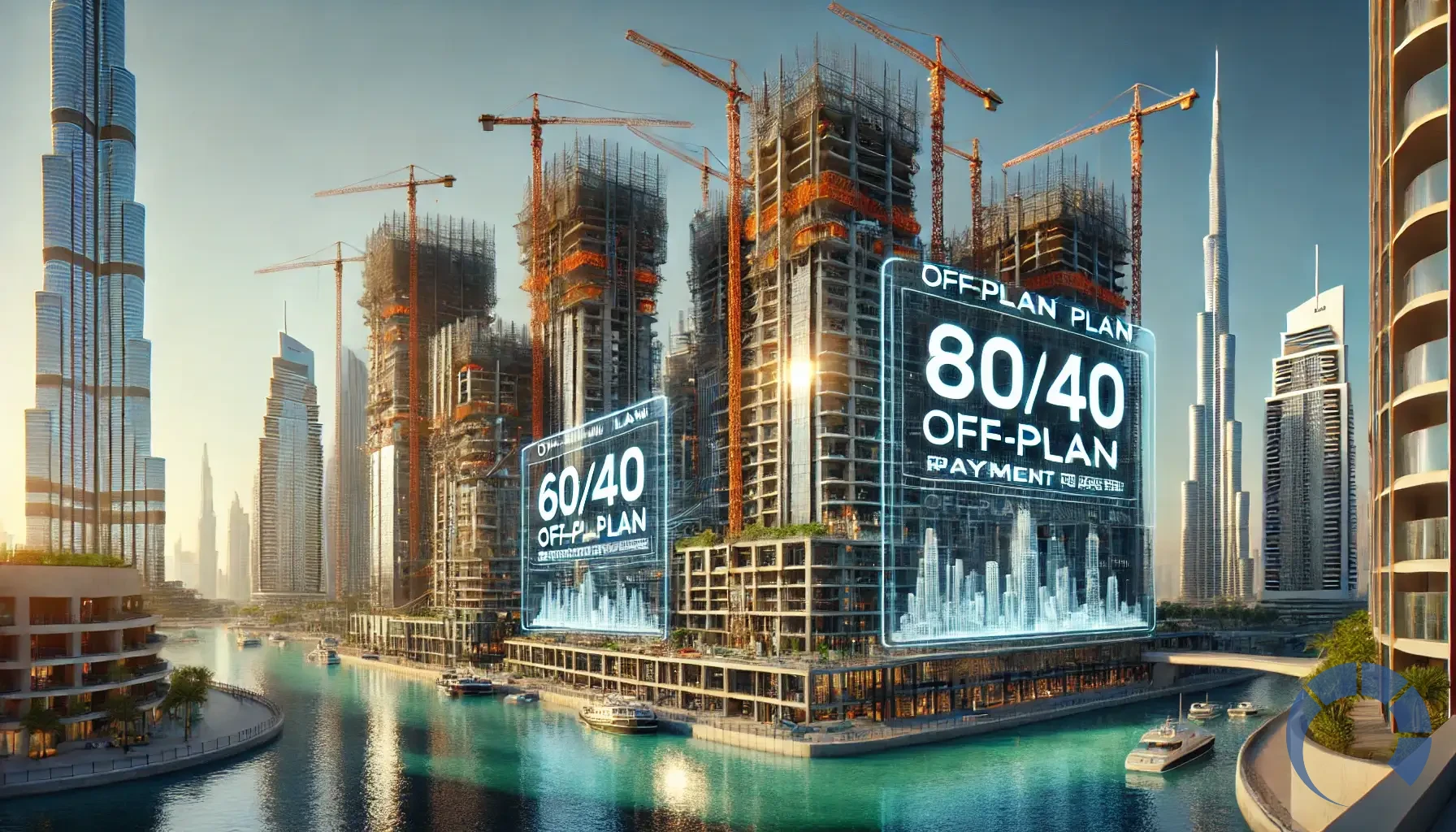
What Are the Payment Plans Like for Off‑Plan Properties in Dubai?
Dubai’s real estate market is renowned for its dynamic developments and forward‑thinking projects. One of the key attractions for investors and homebuyers alike is the flexibility of payment plans available for off‑plan properties. These plans allow buyers to secure a property before construction is complete while enjoying a range of installment options that suit different financial profiles. In this article, we explore the most common payment plans for off‑plan properties in Dubai, discuss their benefits and considerations, and compare specific plans such as the popular 80/20, 60/40, and 50/50 options.
1. Overview of Off‑Plan Payment Plans in Dubai
Off‑plan properties offer a unique opportunity for buyers to invest in a property at a lower initial cost compared to completed homes. The payment plans are designed to spread the financial commitment over the construction period, thereby easing the immediate cash burden and providing flexibility. The most common payment plans in Dubai include:
- 80/20 Plan: Buyers pay 80% of the property value during the construction period and 20% at handover.
- 60/40 Plan: Buyers contribute 60% during construction and settle the remaining 40% upon handover.
- 50/50 Plan: This splits payments equally, with 50% paid during construction and 50% at handover.
- 30/40/30 Plan: A newer option where 30% is paid during the initial construction phase, 40% at handover, and the final 30% spread over an additional 2–3 years.
Each of these plans caters to different buyer needs based on cash flow, risk tolerance, and long‑term investment goals.
2. Understanding the Payment Structures
Construction‑Linked vs. Time‑Linked Payment Models
The structure of off‑plan payment plans in Dubai generally falls into two categories:
- Construction‑Linked Payment Structures: Payments are triggered by reaching specific construction milestones. For example, a buyer might pay a set percentage when the foundation is completed, another portion when the structure is erected, and the final payment upon handover. This model helps ensure that funds are released as the project progresses, aligning the buyer’s payments with the developer’s construction timeline.
- Time‑Linked Payment Structures: Under this model, payments are made at fixed intervals (typically every four months) regardless of the construction progress. This option can provide greater predictability for buyers who prefer a set schedule over milestone‑based payments.
3. Down Payment Requirements
One of the first hurdles for buyers is the down payment. For off‑plan properties in Dubai, down payments typically range from 10% to 20% of the property’s value. This relatively low initial cost is one of the key attractions of off‑plan investments, making it easier for first‑time buyers and investors to enter the market.
4. Benefits of Off‑Plan Payment Plans
Off‑plan properties come with a number of advantages:
- Lower Initial Cost: With a reduced down payment and flexible installment options, buyers can secure a property without the need for a large lump‑sum payment upfront.
- Capital Appreciation Potential: Since the purchase is made before the property is completed, there is an opportunity to benefit from capital gains as the property’s value increases by the time of handover.
- Flexible Financing: The spread‑out payment schedule allows buyers to plan their finances more effectively, ensuring that funds are available throughout the construction period.
- Attractive Incentives: Developers often offer attractive discounts, extended payment terms, or additional upgrades to incentivize off‑plan sales.
- Access to New Developments: Buyers can invest in modern projects with the latest amenities and state‑of‑the‑art designs, which may not be available in the secondary market.
For more insights on off‑plan property investment strategies, check out our guide on The Ultimate Comprehensive Guide to Buying Discounted Properties.
5. Considerations and Potential Risks
While there are many benefits to off‑plan payment plans, buyers must also be aware of several considerations:
- Developer Reputation: It is crucial to research the developer’s track record. A reputable developer reduces the risk of delays or quality issues.
- Hidden Fees and Additional Costs: Some payment plans may include extra fees that increase the overall cost of the property.
- Project Delays: If construction is delayed, buyers may face extended payment obligations or even the need to pay rent during the interim period.
- Resale Restrictions: Some developers may impose restrictions on the resale of a property before handover, limiting the buyer’s flexibility in exiting the investment.
Understanding these factors can help investors and buyers make informed decisions and choose a payment plan that aligns with their financial capabilities and long‑term goals.
6. Deep Dive: The 80/20 Payment Plan
Pros of the 80/20 Payment Plan
The 80/20 plan is one of the most popular payment structures for off‑plan properties in Dubai. Here are its key advantages:
- Lower Upfront Cost: Buyers are required to pay only 20% at handover, making it more accessible for those with limited immediate cash flow.
- Developer Funding: The developer receives 80% of the payment during construction, which often leads to better project financing and timely progress.
- Potential Capital Appreciation: Since buyers are investing early, there is a potential to benefit from significant capital appreciation by the time of handover.
- Financial Flexibility: Payments are spread out over the construction period, allowing buyers to plan their finances and potentially secure loans or other financing later in the process.
Cons of the 80/20 Payment Plan
However, there are also drawbacks to consider:
- Higher Total Cost: The property price might be higher overall as developers incorporate interest costs into the final pricing.
- Risk of Delays: Any construction delays can extend the payment period, potentially causing buyers to face additional financial strain.
- Hidden Fees: Some 80/20 plans may include additional charges that increase the total purchase price.
- Limited Resale Options: Some developers restrict the resale of off‑plan properties before handover, which can limit liquidity.
- Cash Flow Risks: If the market does not perform as expected, buyers may end up paying for a property that does not appreciate as planned.
For a detailed look at property sale innovations, visit PHOREE Real Estate’s InstantSell™: Revolutionizing Property Sales in Dubai.
7. Comparing the 50/50 and 60/40 Payment Plans
The 50/50 Payment Plan
Under the 50/50 payment plan, buyers pay 50% of the property value during the construction phase and the remaining 50% at handover. This balanced approach offers several advantages:
- Equal Distribution: Payments are evenly split, allowing for a more balanced financial outlay.
- Manageable Cash Flow: The equal split can be easier for buyers who plan to have steady funds available at both stages.
- Flexibility at Handover: With 50% due at handover, buyers might have more flexibility if they need to adjust their financing or negotiate final terms.
The 60/40 Payment Plan
The 60/40 payment plan requires buyers to pay 60% during construction and only 40% at handover. This plan shifts a greater portion of the payment to the construction phase. Key differences include:
- Higher Upfront Payment: Buyers must come up with a larger sum during construction, which can be a disadvantage if cash flow is a concern.
- Reduced Burden at Handover: Paying 40% at handover means that the final payment is smaller, easing the financial load when the property is ready.
- Developer Preference: Developers may favor the 60/40 plan because it provides more immediate capital to fund construction, which can lead to a smoother project completion.
- Risk Exposure: With more money paid upfront, buyers might face greater risk if project delays occur or if the market does not appreciate as anticipated.
Key Considerations When Choosing Between 50/50 and 60/40
- Cash Flow: The 50/50 plan offers a more even distribution, which may be preferable for buyers with moderate cash reserves. In contrast, the 60/40 plan requires a higher outlay during construction but reduces the burden at handover.
- Risk Tolerance: Buyers with the financial capacity to pay more during construction might benefit from the advantages offered by the 60/40 plan, such as potentially lower overall costs and better negotiating terms.
- Developer’s Track Record: Some developers might favor one plan over the other. Understanding the developer’s history and project timelines can help in making an informed choice.
For further analysis on investment strategies in Dubai, you can read Dubai Real Estate Investment Trends 2025: Strategies for Maximizing ROI.
8. Benefits of Paying More Upfront in the 60/40 Plan
Paying more upfront in the 60/40 plan can offer several financial and strategic advantages:
- Lower Overall Costs: By committing to a higher payment during construction, buyers may secure a lower overall property price compared to other plans.
- Reduced Financial Burden at Handover: With only 40% due at the final stage, buyers are less pressured to secure large sums at handover, which can be particularly beneficial if market conditions change.
- Enhanced Developer Confidence: A larger upfront payment provides developers with the necessary capital to ensure timely and quality construction, which may translate into a smoother project delivery.
- Better Negotiating Position: Buyers who are willing to invest more during construction may be in a stronger position to negotiate additional incentives or favorable terms from developers.
- Shorter Payment Cycle: A higher pre‑handover payment can mean a shorter overall payment period, allowing buyers to achieve full ownership sooner.
- Risk Mitigation: Paying more upfront can reduce the risk of having a large final payment if project delays extend the construction period. With a lower amount due at handover, buyers might experience less financial strain in a delayed market.
9. Comparing Upfront Costs Across Different Payment Plans
When assessing upfront costs, the 60/40 plan stands out relative to several other common schemes:
- 60/40 vs. 70/30: The 60/40 plan requires less money to be paid during construction than a 70/30 plan, making it a more attractive option for those with tighter cash flow.
- 60/40 vs. 80/20: Although the 80/20 plan has a lower final payment, the 60/40 plan strikes a balance by requiring less upfront than an 80/20 scheme that might include hidden premiums.
- 60/40 vs. 50/50: The 60/40 plan demands a higher upfront cost than the 50/50 plan; however, this higher upfront payment can lead to reduced financial pressure at handover and potentially lower overall costs.
- 60/40 vs. Time‑Linked or Monthly Payment Plans: Compared to plans that allow for very low monthly installments (such as a 1% monthly payment plan), the 60/40 plan requires a significant lump‑sum during construction, which can be a hurdle for some buyers.
Ultimately, the choice of a payment plan should align with your financial profile, risk tolerance, and investment timeline. While the 60/40 plan may involve a higher upfront cost than some alternatives, its advantages in terms of lower final payments and potential negotiation benefits often make it a preferred option for many buyers.
Internal Link: To learn more about leveraging flexible payment plans for off‑plan properties, check out our detailed article What Are the Regulations and Laws Regarding Foreign Ownership of Property in Dubai?.
10. Conclusion
Off‑plan properties in Dubai offer a myriad of payment plan options designed to cater to diverse financial needs. Whether it’s the popular 80/20 plan with its lower upfront cost and potential for capital appreciation, or the 60/40 and 50/50 plans that provide different balances of risk and cash flow management, buyers have the flexibility to choose a plan that best suits their situation.
The 80/20 plan is highly favored for its ease of entry, though it carries risks such as higher long‑term costs and potential hidden fees. In contrast, the 60/40 plan offers a more aggressive upfront investment that may lead to overall cost savings and a reduced burden at handover, while the 50/50 plan balances payments evenly, making it appealing for those with moderate cash reserves.
Investors should carefully weigh these options against their financial capabilities and long‑term goals. It is essential to conduct thorough due diligence on the developer’s reputation, review the terms of the payment plan, and stay informed about market trends. With Dubai’s property market evolving rapidly, the right payment plan can unlock substantial opportunities for growth and profitability.
Ultimately, by understanding the nuances of each payment plan and leveraging the flexibility they offer, buyers can position themselves to take full advantage of the off‑plan market's potential—benefiting from both lower initial costs and the opportunity for capital appreciation as projects near completion.
Internal Link: For further expert analysis on strategic investment approaches in Dubai, visit The Ultimate Comprehensive Guide to Buying Discounted Properties.
PHOREE Real Estate: Your Trusted Partner in Dubai
For those looking to invest in Dubai’s real estate market, PHOREE Real Estate is your trusted partner. With 40 years of American wealth management expertise, AI‑driven insights, and a commitment to client success, PHOREE offers unparalleled guidance and results. Whether you’re evaluating off‑plan payment plans or exploring investment opportunities, our expert team is here to help you make informed, strategic decisions.
To start your investment journey today, contact us:
- Visit:www.phoree.ae
- Hotline: +971549908590
- Email: Info@PHOREE.AE
- Chat on WhatsApp: with our Investment Advisor
Related posts:
Discover PHOREE Real Estate, led by Munawar Abadullah with 30 years of American Wall Street expertise, and learn how our AI-driven insights empower smart investments in Dubai's hotel and real estate markets. PHOREE Real Estate, Munawar Abadullah, hotel investment, Dubai...
Discover the consequences for developers in Dubai who fail to meet handover dates and learn the legal actions buyers can take. This comprehensive guide covers penalties, compensation claims, regulatory intervention, and the steps to take before filing a legal complaint....

